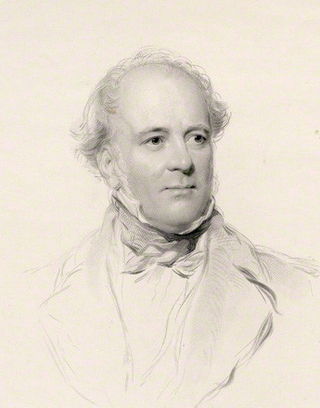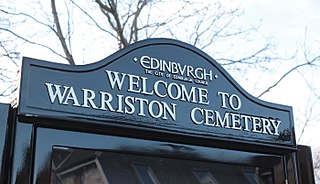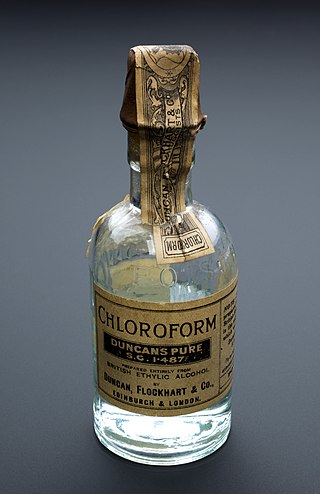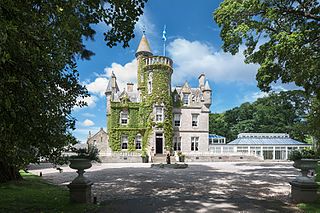
The Dean Cemetery is a historically important Victorian cemetery north of the Dean Village, west of Edinburgh city centre, in Scotland. It lies between Queensferry Road and the Water of Leith, bounded on its east side by Dean Path and on its west by the Dean Gallery. A 20th-century extension lies detached from the main cemetery to the north of Ravelston Terrace. The main cemetery is accessible through the main gate on its east side, through a "grace and favour" access door from the grounds of Dean Gallery and from Ravelston Terrace. The modern extension is only accessible at the junction of Dean Path and Queensferry Road.

Leith is a port area in the north of Edinburgh, Scotland, founded at the mouth of the Water of Leith and is home to the Port of Leith.

Andrew Rutherfurd, Lord Rutherfurd, was a Scottish advocate, judge and politician.
James Moncreiff, 1st Baron Moncreiff was a Scottish lawyer and politician.

David Welsh FRSE was a Scottish Presbyterian minister and academic. He was Moderator of the General Assembly of the Church of Scotland in 1842. In the Disruption of 1843 he was one of the leading figures in the establishment of the Free Church of Scotland.
There have been three baronetcies created for persons with the surname Hutchison, all in the Baronetage of the United Kingdom. Two creations are extant as of 2010.
Sir James David Marwick FRSE was a Scottish lawyer, historian and town clerk. He served as Town Clerk of Glasgow for thirty-one years, during which time the entire city was transformed. Its powers and amenities were improved by by-laws and Acts of Parliament, and Marwick directed the city of Glasgow's development for much of the second half of the 19th century.
Robert Hutchison may refer to:

Warriston Cemetery is a cemetery in Edinburgh. It lies in Warriston, one of the northern suburbs of Edinburgh, Scotland. It was built by the then newly-formed Edinburgh Cemetery Company, and occupies around 14 acres (5.7 ha) of land on a slightly sloping site. It contains many tens of thousands of graves, including notable Victorian and Edwardian figures, the most eminent being the physician Sir James Young Simpson.

Isobel Wylie Hutchison was a Scottish Arctic traveller, filmmaker and botanist. Hutchison published poetry, books describing her travels to Iceland, Greenland, Alaska, and the Aleutian Islands, and articles in National Geographic and other magazines. She lectured frequently, using her films, photographs and paintings to illustrate her talks. Her papers were gifted to the National Library of Scotland by her long-time friend Medina Lewis.

Sir Robert Hutchison, 1st Baronet, FRCP was a Scottish physician and paediatrician, and the original editor of the medical books, Clinical Methods and Food and the Principles of Dietetics.

John Hutchison was a Scottish sculptor based in Edinburgh. He was the son of an unnamed builder, and his artistic life began as a thirteen-year-old woodcarving apprentice. He attended art school in the evenings, then later became a student at the Trustees Academy. and attracted the patronage of its owner, Patrick Allan Fraser, who gave him commissions to fund his study in Rome. Although after Rome he continued to enjoy ancient Roman sculptural themes, he remained in Edinburgh for the rest of his life, working in wood, clay and marble, and concentrating on portraiture of Scottish people, and images of Scottish myth and history. He created the bust of Sir Walter Scott in Poets' Corner in Westminster Abbey. He was a successful artist who received commissions from Queen Victoria.

Charles George Hood Kinnear FRIBA ARSA FRSE was one half of Peddie & Kinnear partnership, one of Scotland’s most renowned and prodigious architectural firms. They were noted for their development of the Scots Baronial style, typified by Cockburn Street in Edinburgh, which evokes a highly medieval atmosphere. Kinnear was also a pioneer photographer credited with inventing the bellows attachment on early cameras.

Sir Thomas Jamieson Boyd, publisher and philanthropist, was Lord Provost of Edinburgh from 1877 to 1882. He was the catalyst behind the building of the Edinburgh Royal Infirmary on Lauriston Place.

James Duncan FRSE FRCS FRCSE was a Scottish surgeon and manufacturing chemist responsible for much of the British supply of chloroform in the mid-19th century. From 1839 to 1866 he was Director of Duncan Flockhart & Co one of Scotland’s largest chemical manufacturers.

Sir Thomas Hutchison was a Scottish landowner and politician. He served as Lord Provost of Edinburgh from 1921 to 1923.
James Pringle FRSE FRSGS (1822–1886) was a Scottish rope manufacturer who served as Provost of Leith 1881 until 1886.

Carlowrie Castle was built in the Scottish Baronial style between 1852 and 1855 on the outskirts of Kirkliston, a town approximately 10 miles from Edinburgh, Scotland. It has only ever belonged to two families: the Hutchison family, who built it, and the Marshall family, who acquired it 130 years later.
Arthur Abney Walker FRSE (1820–1894) was a 19th-century British botanist.
Robert Howie Fisher (1861–1934) was a Scottish minister in the 19th century who became Chaplain in Ordinary to King George V in Scotland from 1913.













